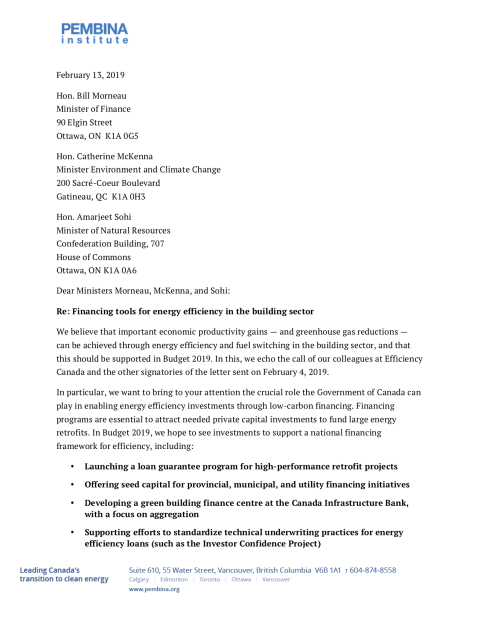The Pembina Institute has sent the following letter to Canada's ministers of finance, environment and climate change, and natural resources:
February 13, 2019
Hon. Bill Morneau
Minister of Finance
90 Elgin Street
Ottawa, ON K1A 0G5
Hon. Catherine McKenna
Minister of Environment and Climate Change
200 Sacré-Coeur Boulevard
Gatineau, QC K1A 0H3
Hon. Amarjeet Sohi
Minister of Natural Resources
Confederation Building, 707
House of Commons
Ottawa, ON K1A 0A6
Dear Ministers Morneau, McKenna, and Sohi:
Re: Financing tools for energy efficiency in the building sector
We believe that important economic productivity gains — and greenhouse gas reductions — can be achieved through energy efficiency and fuel switching in the building sector, and that this should be supported in Budget 2019. In this, we echo the call of our colleagues at Efficiency Canada and the other signatories of the letter sent on February 4, 2019.
In particular, we want to bring to your attention the crucial role the Government of Canada can play in enabling energy efficiency investments through low-carbon financing. Financing programs are essential to attract needed private capital investments to fund large energy retrofits. In Budget 2019, we hope to see investments to support a national financing framework for efficiency, including:
• Launching a loan guarantee program for high-performance retrofit projects
• Offering seed capital for provincial, municipal, and utility financing initiatives
• Developing a green building finance centre at the Canada Infrastructure Bank, with a focus on aggregation
• Supporting efforts to standardize technical underwriting practices for energy efficiency loans (such as the Investor Confidence Project)
• Leveraging available funding to encourage provinces to adopt the latest national codes and providing support to local governments for their enforcement
Recommendations on these actions are further detailed in Federal Policies for Low-Carbon Buildings: A blueprint to implement the Pan-Canadian Framework buildings strategy, a report we jointly published with Équiterre in 2017.
If we get to work now, Canada could have a zero-emissions building stock by 2050. An ambitious energy efficiency agenda, supported by complementary policies promoting fuel switching and distributed renewable energy, is key to spurring the transition to low-carbon homes and buildings. Energy efficiency acts as an economic stimulus, boosting productivity, increasing global competitiveness, and creating jobs. Clean Energy Canada’s Economic Impact Study showed that a full implementation of the PCF would create on average 118,000 jobs across the country. Without these investments, Canada is at risk of lagging behind, and losing the competitive edge as our productivity decreases. Low-carbon homes and buildings represent both a climate mitigation and wealth creation opportunity — an opportunity Canada is ready to seize.
Yours sincerely,
Tom-Pierre Frappé-Sénéclauze
Director of Buildings and Urban Solutions
Pembina Institute








